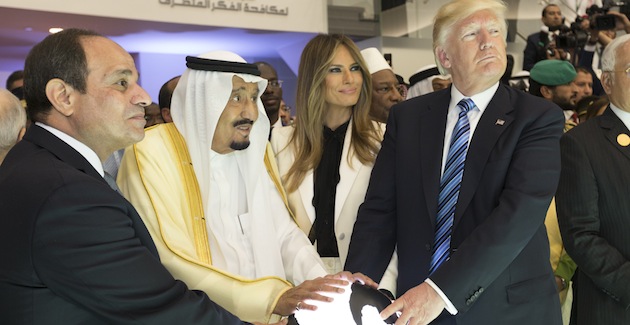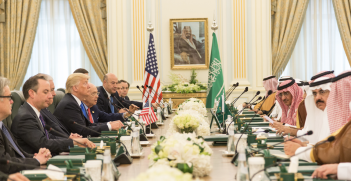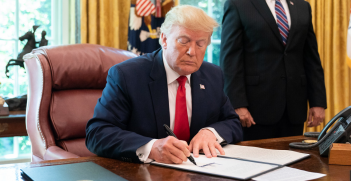Qatar's Blockade: The Story So Far

US Secretary of State Rex Tillerson has flown back to the US from the Persian Gulf after the most concerted effort yet to resolve the Saudi-Qatar dispute. He says he is optimistic, but a closer look at the background to the crisis suggests meaningful compromise may be hard to achieve.
The Saudi-led blockade of Qatar has presented the Persian Gulf with a new crisis. The rapid escalation of tensions has undermined the idea of unity and common purpose among the Arab member states of the Gulf Cooperation Council (GCC). The key issues raised by Saudi Arabia, Bahrain, the United Arab Emirates and Egypt go to the heart of Qatar’s desire to drive an ambitious foreign policy to expand its reach and soft power in the Arab world. These issues focus on the state-funded Al Jazeera network, alleged sponsorship of terrorism and being soft on Iran.
Al Jazeera
First and foremost is the Saudi wish to close the Al Jazeera broadcasting network, which has been operating since 1996 out of Doha. Al Jazeera revolutionised news coverage in the Arab world. Despite being state-owned, it was given significant freedom to run an independent editorial line and cover topical issues that faced the Arab world (except, of course, issues in Qatar).
Bolstered by state funds, Al Jazeera soon expanded its operation and launched Al Jazeera English, gaining an international reputation as a reliable source of news to rival BBC and Reuters. The news coverage of Al Jazeera and its investigative journalism was unprecedented for the region. This was most evident during the turbulent Arab Spring when Al Jazeera antagonised incumbent elites from Egypt to Bahrain. Saudi Arabia, in particular, saw the coverage as fanning the fire of public discontent and portraying the actions of the region’s governments in a negative light.
The Arab Spring in Egypt led to the electoral victory of the Muslim Brotherhood in 2012. The Muslim Brotherhood’s rule, however, was cut short by General Abdel Fattah Al-Sisi in a military coup on 3 July 2013. Al Jazeera was there to offer full coverage of the coup. Consequently it became a target of the new regime: three of its reporters were charged with inciting terror (including Australian journalist Peter Greste).
By this time the Muslim Brotherhood was labelled as a terrorist organisation in Egypt, putting Qatar and Saudi Arabia on opposite sides. Qatar had previously established a working relationship with the Muslim Brotherhood and provided sanctuary to Yusuf al-Qaradawi, a prolific Islamic theologian widely regarded as the spiritual leader of the Muslim Brotherhood. In contrast Saudi Arabia and the United Arab Emirates welcomed Sisi to office, with Saudi Arabia pledging a US$12 billion rescue package to jump-start Egypt’s ailing economy within a week of the July military takeover.
Hamas
Accusations that Qatar is actively sponsoring terrorism largely relate to its relationship with the Muslim Brotherhood. Qatari links with Hamas and other unsavoury armed groups in the Syrian war are also alleged. After Hamas broke away from its long-time Iranian patronage in 2012, Qatar’s Sheikh Hamad bin Khalifa al-Thani, seeing an opportunity to fill the gap, became the first head of state to visit the Hamas-controlled Gaza strip in the same year. In subsequent years, Qatar provided much-needed aid and investment in Gaza. And it was largely seen as offering legitimacy to Hamas, even though Hamas is a designated terrorist organisation according to the US State Department.
Qatar was clearly seeking to expand its soft power in the Arab world and gain diplomatic clout by appearing benevolent to the Palestinians. The picture was much more confused in the Syrian war as both Saudi Arabia and Qatar threw vast amounts of money at various rebel groups, many of which later morphed into affiliates of the Islamic State (IS) or Jubhat al-Nusra (aligned with Al-Qaeda).
But accusing Qatar of sponsoring terrorism clearly misses the point: first, about the fluidity of the rebel group affiliations in Syria; and, more importantly, about the ideological foundations of IS and al-Qaeda. Both groups draw on puritanical Wahhabi teachings, the official creed of the Saudi Kingdom. The Wahhabi code of intolerance for other religions and sects, taught in the Saudi education system, produced 15 out of the 19 al-Qaeda terrorists responsible for the 9/11 attacks. IS has used that code to justify killing Shi’a, Yazidis and Alawites in the region, as well as committing terror attacks against ‘infidels’ in the West. This makes Saudi accusations of sponsoring terrorism levelled against Qatar ring hollow.
Iran
Finally, Qatar’s position in relation to Iran is complicated. The GCC was established in 1981 as a response to shared concerns that the new Islamic Republic of Iran was a source of instability. Saudi Arabia, Bahrain and the United Arab Emirates have been most ardent in their opposition to Iran. The Saudis see Iran as a serious regional rival. Bahrain is concerned with the loyalty of its large Shia population (estimated at 70 per cent) and Iran’s reach. And the United Arab Emirates has been in a territorial dispute with Iran over three islands at the mouth of the Hormuz Straight since the UAE’s formation in 1971.
Doha has been generally consistent with the GCC in relation to Iran, but it is also mindful of its common interests with Tehran regarding a shared active natural gas field. For that reason, Qatari leaders have shied away from some of the more outlandish language used in Riyadh and Abu Dhabi against Iran. The most recent example, and perhaps the trigger for the current crisis, was the Qatari Emir’s declaration that aggressive rhetoric against Iran was unhelpful. This came immediately after the Riyadh summit with US President Donald Trump where Iran was targeted as presenting the greatest threat to regional security. Qatari officials subsequently sought to contain the damage and claimed that the Emir’s speech was misquoted, blaming hackers.
The Saudi-led reaction to Qatar has been in the making for over a decade. Qatar’s desire to carve out a role for itself in the region has often put it at odds with the Saudi agenda. However, changes of leadership in Saudi Arabia and the United States have allowed these tensions that have been simmering in the background to boil over. The new Saudi leadership under King Salman bin Abdulaziz (since 2015), has been much more assertive than it was under his predecessor. He has been eager to challenge Iran, a posture that appeals to US President Donald Trump. Yet, the course of the blockade on Qatar has not elevated the Saudi position. If anything, it has revealed Riyadh’s weakness, with its inability to pull Doha back in line, and offered an opening for Iran to exploit.
The blockade appears to have been counter-productive. Following a few days of panic buying, Qatari shops have since been restocked by Turkish, Iranian and Indian goods. Qatari officials and commentators have accused Saudi Arabia of treating Qatar as a province of its kingdom, not as a sovereign state. This has stirred up nationalist sentiments in the young emirate; this is likely to make a compromise even harder to reach.
Professor Shahram Akbarzadeh researches Middle East and Central Asian politics at the Alfred Deakin Institute for Citizenship and Globalisation at Deakin University and is the convenor of its Middle East Studies Forum. His latest publication is with Dara Conduit: ‘Iran in the World‘ (Palgrave 2016).





